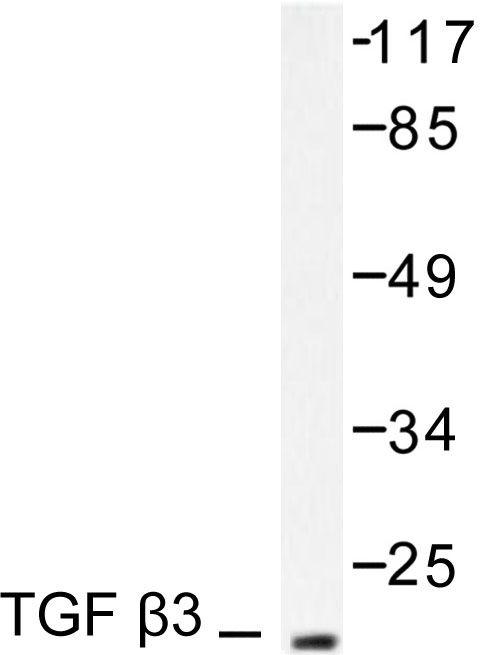TGF beta 3 (TGFB3) Rabbit Polyclonal Antibody
Other products for "TGFB3"
Specifications
| Product Data | |
| Applications | IHC, WB |
| Recommended Dilution | Western blot: 1/500-1/1000. Immunohistochemistry on Paraffin Sections: 1/50-1/200. |
| Reactivities | Human, Mouse, Rat |
| Host | Rabbit |
| Clonality | Polyclonal |
| Immunogen | Synthetic peptide, corresponding to amino acids 261-310 of Human TGF β3. |
| Specificity | This antibody detects endogenous levels of pro-TGF-beta-3 (47 kDa) and cleaved-TGF-beta-3 (13 kDa) protein. (region surrounding Gly292) |
| Formulation | Phosphate buffered saline (PBS), pH~7.2 State: Aff - Purified State: Liquid purified Ig fraction (> 95% pure by SDS-PAGE) Preservative: 0.05% Sodium Azide |
| Concentration | 1.0 mg/ml |
| Purification | Affinity Chromatography using epitope-specific immunogen |
| Conjugation | Unconjugated |
| Storage | Store undiluted at 2-8°C for one month or (in aliquots) at -20°C for longer. Avoid repeated freezing and thawing. |
| Stability | Shelf life: one year from despatch. |
| Predicted Protein Size | ~50 kDa |
| Gene Name | transforming growth factor beta 3 |
| Database Link | |
| Background | Transforming Growth Factor beta 3 (TGF beta 3) is a member of the TGF beta family of growth factors. The TGF beta polypeptides are multifunctional; capable of influencing cell proliferation, differentiation, and other functions in a wide range of cell types. Transformed, as well as nonneoplastic tissues, release transforming growth factors; and essentially all mammalian cells possess a specific TGF receptor. The multi-modal nature of TGF beta is seen in its ability to stimulate or inhibit cellular proliferation. In general, cells of mesenchymal origin appear to be stimulated by TGF beta whereas cells of epithelial or neuroectodermal origin are inhibited by the peptide. A high level of TGF beta 3 in normal adult heart, lung, and brain suggests a possible role for this factor in the regulation of a variety of normal physiological functions. The expression of TGF beta 3 in different locations and at specific stages of embryogenesis suggests its involvement in the regulation of development. Similar to the other isoforms of TGF beta, the upregulated activation of TGF beta 3 might also be involved in a variety of pathological conditions. TGF beta 3 has been detected in human, porcine, and avian sources and is expressed in cells of mesenchymal origin, suggesting a different role for this protein than for TGF beta 1 or TGF beta 2. TGF beta 3 is less prevalent in natural expression than either TGF beta 1 or TGF beta 2, but is the most abundant mRNA expressed in chick embryos. It is also expressed in human umbilical cord and in several human carcinoma cells. |
| Synonyms | Transforming growth factor beta-3 |
| Reference Data | |
Documents
| Product Manuals |
| FAQs |
| SDS |
{0} Product Review(s)
0 Product Review(s)
Submit review
Be the first one to submit a review
Product Citations
*Delivery time may vary from web posted schedule. Occasional delays may occur due to unforeseen
complexities in the preparation of your product. International customers may expect an additional 1-2 weeks
in shipping.






























































































































































































































































 Germany
Germany
 Japan
Japan
 United Kingdom
United Kingdom
 China
China




